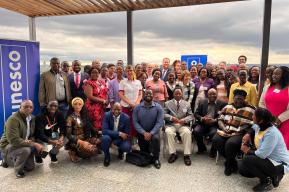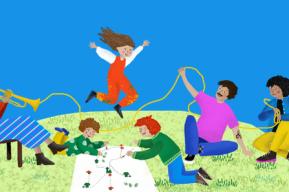News
Interview: Seven questions to Salimatou Fatty, Human Right Activist from The Gambia

Meet Salimatou Fatty, a young human rights activist and gender advocate from The Gambia. The 27-year-old woman is one of the most influential young leaders in Africa today. She is the founder of the Salimatou Foundation for Education (SaFE) and she is a peace Ambassador at One Young World, also known as the "Davos World Economic Forum" for youth.
1. You founded the Salimatou Foundation for Education in 2015, how did you come up with the idea of making this foundation?
I grew up in an economic disadvantaged home as a child and I faced many obstacles especially with regards to my education. At some point in my basic education, I nearly drop out of school, but with my mother’s continuous encouragement and persistence, I was able to complete my basic education and to obtained my bachelors in Law. My story which I believed at the time numerous young girls and boys endure, inspired me to create the Salimatou Foundation for Education (SaFE) in order to ensure people’s rights to education is respected, promoted and fulfilled. I have witnessed some of my childhood friends dropped out of school and been married off at an early age. This and many other reasons also contributed in creating the foundation to provide safe spaces for people, especially girls.
2. What are the main objectives of the SaFE and what are the projects carried out by the foundation?
Its main objectives are:
- To ensure every child’s right to education is respected, promoted and fulfilled;
- To promote culture of peace, youth empowerment and collaborate with state and non-state actors to fulfill our objectives.
There are numerous activities carry out by the foundation and they include: a mentorship program for teenagers; school visits to ensure students know and value the importance of education; donations to less privileged pupils; and career development coaching, etc.
4. How would you define the culture of peace?
In my view, it’s a culture that is part of life; a part of everything one is doing or about to venture into. It must be seen as a very essential tool in making life better for you and everyone else.
5. What is the role of youth in achieving a culture of peace in Africa?
The role of the youth in achieving a culture of peace in Africa cannot be over emphasized. The youth must believe in themselves; the powers they possess in making Africa better; and wisely use it to promote cohesiveness, peaceful coexistence and well-developed Africa where respect for diversity is guaranteed.

6. How can we better integrate African youth in discussions related to the development of the continent?
Africa youth must be in the centre of the discussions related to the development of the Africa as a continent. At the discussions, the youth voices must be at the centre, the focus should be more on the youth and they must be empowered to take ownership of the continent and be continuously reminded about their fundamental role in attaining and sustaining any meaningful development in Africa.
7. What advice would you give to other young African leaders who would like to undertake on projects like yours?
My advice to young people has always been to believe in themselves. Be firm and decisive over what you believe in; stay focused and determined. There is never a smooth road in achieving great end. Young people must be ready and willing to take up challenges and be ready to overcome obstacles. There isn't any shortcut to meaningful development. There is one gate and its keys are clarity of the vision, commitment, steadfastness and resilience.
Find out about the Biennale of Luanda here








